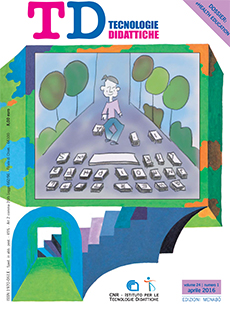Tra tradizione e innovazione: la costruzione discorsiva di un’università “world-leading”
Contenuto principale dell'articolo
Abstract
Dettagli dell'articolo
Sezione
Gli autori che pubblicano su questa rivista accettano le seguenti condizioni:
- Gli autori mantengono i diritti sulla loro opera e cedono alla rivista il diritto di prima pubblicazione dell'opera, contemporaneamente licenziata sotto una Licenza Creative Commons CC BY 4.0 Attribution 4.0 International License.
- Gli autori possono aderire ad altri accordi di licenza non esclusiva per la distribuzione della versione dell'opera pubblicata (es. depositarla in un archivio istituzionale o pubblicarla in una monografia), a patto di indicare che la prima pubblicazione è avvenuta su questa rivista.
- Gli autori possono diffondere la loro opera online (es. in repository istituzionali o nel loro sito web) prima e durante il processo di submission, poiché può portare a scambi produttivi e aumentare le citazioni dell'opera pubblicata (Vedi The effect of Open Access).
Riferimenti bibliografici
Bakhtin, M. M. (2010). The dialogic imagination: Four essays. Austin, TX: University of Texas Press.
Bauman, Z. (2013). Liquid modernity. John Wiley & Sons. Binkley, S. (2008) Liquid Consumption. Cultural Studies, 22(5), 599-623.
Breslow, L., Pritchard, D. E., DeBoer, J., Stump, G. S., Ho, A. D., & Seaton, D. T. (2013). Studying learning in the worldwide classroom: Research into edX’s first MOOC. Research & Practice in Assessment, 8, 13-25.
Bulfin, S., Pangrazio, L., & Selwyn, N. (2014). Making ‘MOOCs’: The construction of a new digital higher education within news media discourse. The International Review of Research in Open and Distance Learning, 15(5).
Colvin, K. F., Champaign, J., Liu, A., Zhou, Q., Fredericks, C., & Pritchard, D. E. (2014). Learning in an introductory physics MOOC: All cohorts learn equally, including an on-campus class. The International Review of Research in Open and Distance Learning, 15(4).
Czerniewicz, L., Deacon, A., Small, J., & Walji, S. (2014). Developing world MOOCs: A curriculum view of the MOOC landscape. JOGLTEP, 2(3).
Fairclough, N. (1993). Critical discourse analysis and the marketization of public discourse: The universities. Discourse & Society, 4(2), 133-168.
Fairclough, N. (2000). New Labour, new language?. London, UK: Routledge - Taylor & Francis.
Fairclough, N. (2003). Analysing discourse: Textual analysis for social research. London, UK: Routledge - Taylor & Francis.
Habermas, J. (1984). The Theory of Communicative Action. Cambridge, UK: Polity Press.
Halliday, M. A. (1994). Functional grammar. London, UK: Edward Arnold.
Kristeva, J. (1986). Word, dialogue and novel. In The Kristeva Reader, Oxford, UK: Basil Blackwell. Retrieved from https://archive.org/stream/ TheKristevaReader/The Kristeva Reader_djvu.txt
McAuley, A., Stewart, B., Siemens, G., & Cormier, D. (2010). The MOOC model for digital practice. Massive Open Online Courses, digital ways of knowing and learning. Retrieved from https:// oerknowledgecloud.org/sites/oerknowledgecloud. org/files/MOOC_Final_0.pdf
Perna, L. W., Ruby, A., Boruch, R. F., Wang, N., Scull, J., Ahmad, S., & Evans, C. (2014). Moving Through MOOCs Understanding the Progression of Users in Massive Open Online Courses. Educational Researcher, 43(9), 421-432. doi: 10.3102/0013189X14562423
Perrotta, C., Czerniewicz, L., & Beetham, H. (2015). The rise of the video-recorder teacher: the sociomaterial construction of an educational actor. British Journal of Sociology of Education, 1-17. doi: 10.1080/01425692.2015.1044068
Scott, M. (2004). WordSmith tools version 4. Oxford, UK: Oxford University Press.
Swales, J. (2004). Research genres: Explorations and applications. Stuttgart, DE: Ernst Klett Sprachen.
Wernick, A. (1991). Promotional culture: Advertising, ideology and symbolic expression. London, UK: Sage Publications, Inc.
Wodak, R., & Meyer, M. (Eds.). (2009). Methods for critical discourse analysis. London, UK: Sage Publications, Inc.

